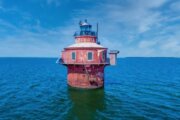BRUSSELS (AP) — As tensions with Russia simmer, European Union leaders met Wednesday with their counterparts from Ukraine and four other former Soviet republics and pledged to deepen political, trade, energy and cultural ties.
The EU’s Eastern Partnership includes Armenia, Azerbaijan, Belarus, Georgia, Moldova and Ukraine. The president of Belarus, Alexander Lukashenko, is boycotting the forum due to EU sanctions over reported fraud in his reelection last year a security crackdown on antigovernment protesters that followed.
A Belarus flag was left at the summit table where he would have sat. “There was an empty chair in the room, and I hope that this chair will soon be filled by a legitimate, democratically elected Belarusian leader,” European Commission President Ursula von der Leyen said.
The Eastern Partnership was set up after Moscow sent troops into Georgia in 2008, stunning the Europeans and much of the world. It aims to improve and deepen relations among the six countries, most of which share borders with Russia and are strategically important energy hubs, as well as with the 27-nation EU.
The meeting was intended to affirm the participants’ “strong commitment to our strategic, ambitious and forward-looking” partnership, based “on common fundamental values,” according to the final summit declaration.
The 32 countries taking part said they “are bound by our joint determination to further strengthen democracy and the rule of law in our societies,” according to the text, which was released after five hours of talks in Brussels.
The word “Russia” was not once mentioned in the nine-page declaration, despite Moscow’s opposition to any of the six countries involved in the partnership deepening ties with the EU.
The EU announced that it would offer the Eastern countries a 2.3 billion-euro ($2.6 billion) economic and investment plan, which the bloc hopes will attract up to 17 billion euros ($19 billion) in public and private investments for the region.
The EU also emphasized the need for “differentiation” — the acceptance that some of the six may be in a position to deepen their relations with the bloc more quickly. Georgia, Moldova and Ukraine, for example, have free trade pacts that ease tariffs and other barriers to European trade.
In 2014, Ukraine’s then president, Petro Poroshenko, signed its trade deal, ignoring vehement opposition from Moscow, and declared that his country wanted to join the EU. His pro-Russian predecessor was forced to flee Ukraine after his rejection of the free trade deal sparking months of pro-EU demonstrations.
Copyright © 2024 The Associated Press. All rights reserved. This material may not be published, broadcast, written or redistributed.






